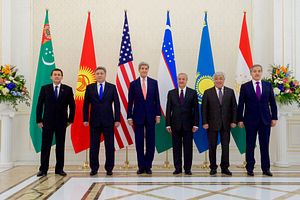What state to citizens in the former Soviet Union view as the biggest threat? Last year Gallup polled thousands across Eastern Europe and Eurasia about which state they viewed as the biggest threat. “What one country in the world would you say poses the greatest threat to your country?” People were asked. The results released this week are interesting, though not necessarily surprising. In responses from across the countries polled–EU-states in Eastern Europe, non-EU states in Eastern Europe and the countries of the Commonwealth of Independent States (CIS)–both Russia and the United States appeared.
In the open-ended poll, the divide between EU and non-EU states in Eastern Europe was wide. Forty percent of those polled in EU member states in Eastern Europe named Russia as the greatest threat (only 4 percent said the U.S.). Non-EU members are more focused on their neighbors, only 13 percent of those polled said the U.S. was their biggest threat (only 3 percent said Russia). Case and point: Armenians said Azerbaijan, and Azeris said Armenia.
“Residents in CIS countries (plus Georgia) are more mixed on who is the biggest threat, but overall are slightly more likely to name Russia as the biggest threat than the U.S.,” Gallup said.
Twenty-two percent of citizens in the CIS saying Russia was the biggest threat and 16 percent responded that it was the United States. On a country-by-country level, the responses are varied.
For example, the most common response to the question in Belarus, Kazakhstan and Kyrgyzstan was the United States (with 44, 36, and 33 percent of those polled saying so). In Russia, 64 percent pointed to the U.S. as the country’s biggest threat.
Those in the larger Eurasian region that identified Russia as the biggest threat are predictable– Ukraine (52 percent) and Moldova (16 percent)–given Russian involvement in conflicts in those countries.
People polled in Turkmenistan and Uzbekistan said Afghanistan (51 and 16 percent) was the biggest threat, a nod to worries about the spillover of conflict from the war there. However, those polled in Tajikistan, which shares an extensive border with Afghanistan–including with Kunduz province where violence intensified last year–nonetheless said Syria was the country’s biggest threat.
As the poll was open-ended, some respondents even said ISIS was the biggest threat, despite the fact it’s not a country. According to Gallup’s write-up, “as many as 15 percent in Tajikistan” mentioned ISIS. The group was mentioned elsewhere as well, in Albania (15 percent), Kazakhstan (9 percent), the Czech Republic (8 percent), Bulgaria (6 percent) and Moldova (5 percent).
These various responses reveal, if nothing else, what conflicts are on the minds of random citizens. The Gallup write-up did not mention where in each country the surveys were taken, though it did say they were based on face-to-face interviews conducted between June and September 2015. Many in Central Asia get their news from Russia, which, to say the least, often paints the U.S. unfavorably. Rumors about nefarious U.S. plots to destabilize the region (for… reasons…) are popular.
Tajikistan’s most common response–Syria–is likely best tied to what threats Tajik authorities played up the most last year. In May 2015, the Tajik OMON commander who had gone missing turned up in an ISIS promotional video. The early summer was characterized by a flood of news about Gulmurod Halimov, Syria, and ISIS and the conversation churned on into the fall when the state labeled the country’s formerly legal Islamist opposition party as an extremist organization.

































